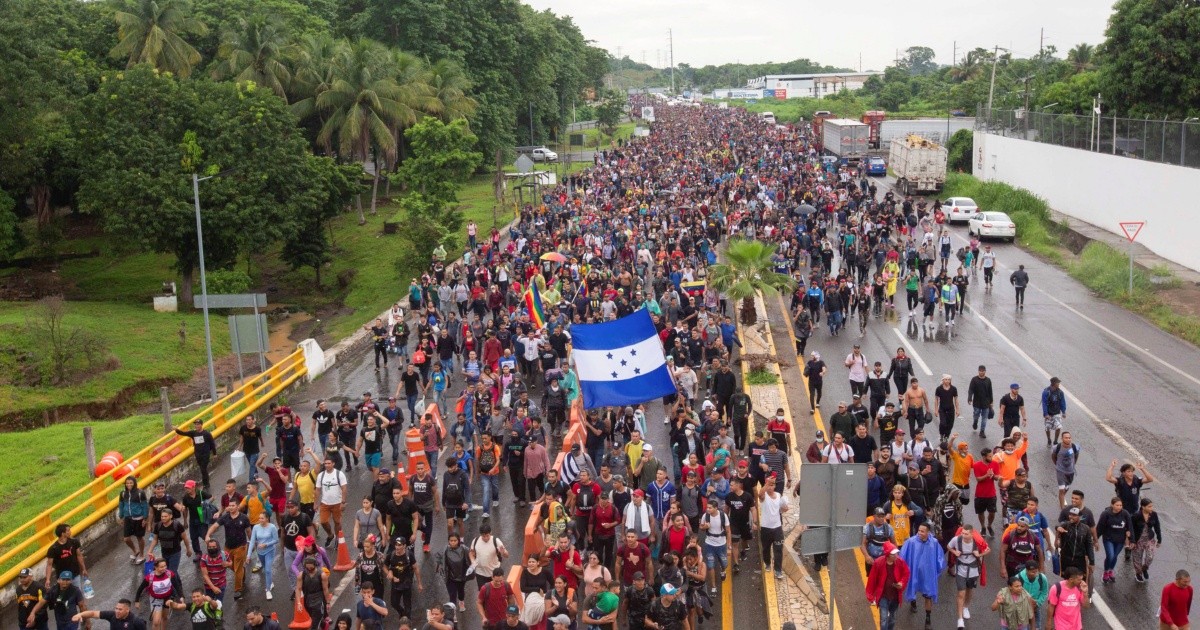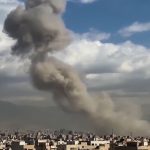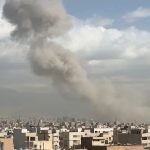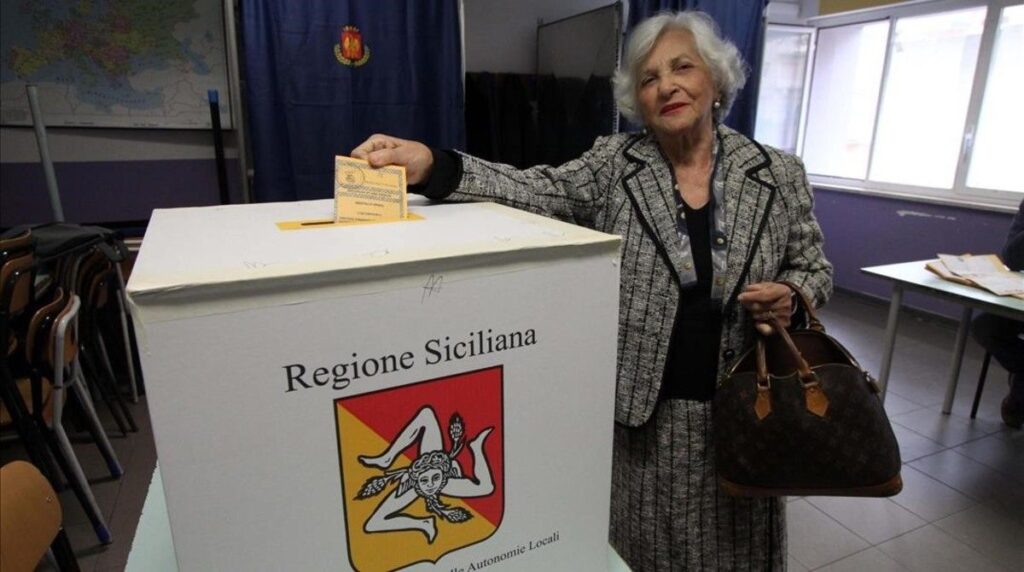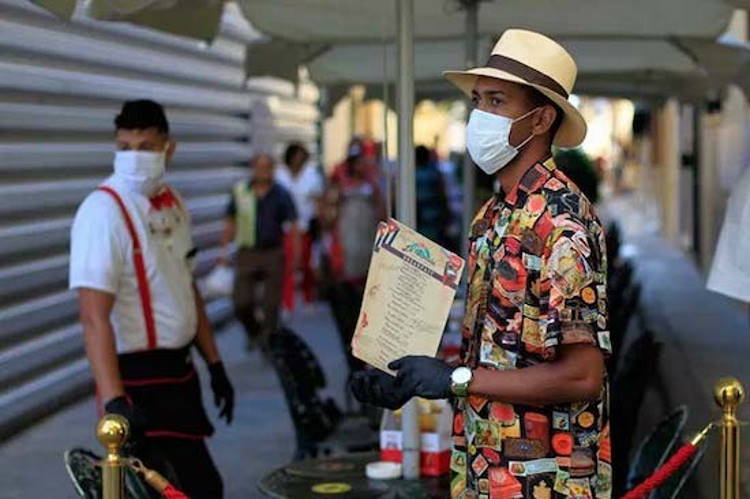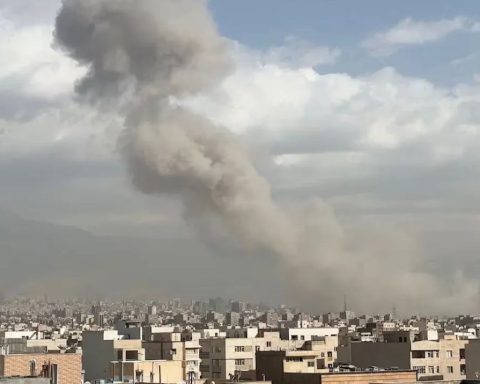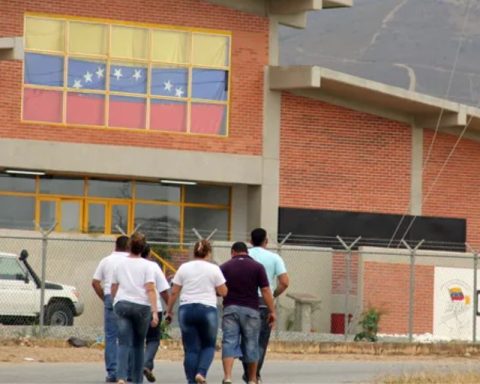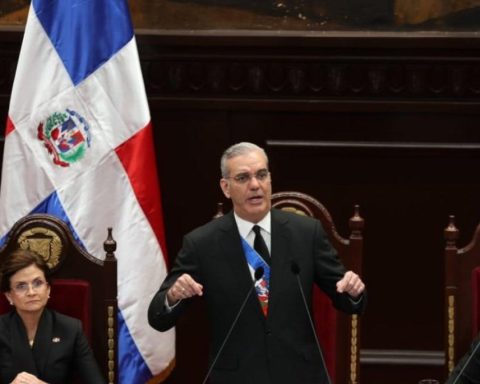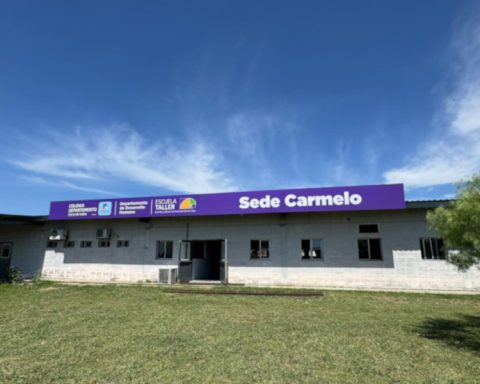The week that just ended, while the IX Summit of the Americasin Los Angeles, California, where the United States government was seeking agreements to curb migratory flows, the city of Tapachula, where for the last three years the Mexican government has decided to contain foreigners seeking to reach the country’s northern border , began to overflow: a column of around 10,000 Venezuelans, Cubans, Central Americans and Africans advanced towards the northern border of the country, with the aim of entering US territory.
The caravan of foreigners, which by Friday had already fragmented on the highways in the south of the country, is the manifestation of a greater problem. According to the organization dedicated to research on human rights in the Americas, WOLA, academics and specialists consulted by this newspaper, the long waiting times forced on migrants seeking refugee status, as well as the decision of the authority to contain them in the south of the country, generated a humanitarian crisis.
flee from violence
Carlos Alberto González Zepeda, member of the Research Group of the Seminar on Multidisciplinary Studies on International Migration (GI-SEMMI) at the Autonomous Metropolitan University (UAM), Cuajimalpa unit, commented that it is a humanitarian crisis that has its origin in displacement of dozens of people from countries where there are difficult situations, from which he has been fleeing.
“In past years there was talk of an eminently labor situation, but in recent years it has to do particularly with the violence that prevails in their countries of origin, both that caused by criminal organizations and that caused by the State. That forces them to run away to survive,” he explained.
For her part, Alejandra Macías Delgadillo, executive director of Asylum Access, called attention to the fact that in most cases of people who have entered Mexico in recent months, they are people seeking international protection.
“They are fleeing their countries due to the contexts of violence they suffer. For this reason, it is very important that the Mexican government have protocols to be able to identify those who may qualify for refugee status,” he stressed.
The specialist recalled that the Mexican government has assumed specific commitments in this area, by ratifying international agreements and treaties, such as the 1951 convention, which obliges governments to guarantee the principle of non-refoulement to a country where their lives were at risk.
“In practice this is not being carried out, because those who are making the arrests are both the National Guard and the National Migration Institute, who do not have these protocols and do not give access to the procedure and, therefore, the Commission Mexicana de Ayuda a Refugiados (Comar) cannot make an evaluation of those who can be recognized as refugees or as subjects of complementary protection.”
The renowned activist said that it is necessary to be clear that refugees are those who are forced to leave their countries of origin, due to a situation of great violence or persecution. The reasons for fleeing can be political, religious, nationality, race, belonging to a certain social group or to escape from situations of generalized violence or massive violation of human rights.
He recalled that it is a human right to request asylum; the problem is that those who need it are not guaranteed the right.
Macías Delgadillo emphasized that the long wait in the south of the country affects these people not only physically, but also in their emotional well-being, due to the uncertainty in which they live.
For the activist, this translates into institutional violence by the Mexican government by placing these people in a serious situation of constant risk.
Photo: AFP
In Tapachula there are thousands of stranded migrants
What is happening today in Tapachula and, according to activists, is reaching an unbearable situation, began to take shape several years ago. In 2017, an increase in the arrival of migrants began to be noticed, particularly asylum seekers, and then it grew exponentially in 2019.
Although there is no census of migrants who remain in Tapachula, Chiapas, where there are plenty of places, official data on asylum seekers gives us an idea of the dimension of the problem.
In 2017, the Refugee Aid Commission (Comar) registered 70,327 asylum applications, when in 2018 it attended 29,574, which means an increase of 138%. With the pandemic it dropped to 40,945, but, for 2021, the figure was really dramatic, since 130,627 applicants were registered that year, which represents an increase of 342%, if compared to 2018. If compared with 2013, when 1,296 requests then increased about 100 times.

In 2021, Comar resolved 38,054 asylum cases, with a granting rate of 72% or 74% if the so-called complementary protection is taken into account.
The problem is that there is a backlog in the review of asylum applications, in addition to the fact that they continue to increase. From January to April 2022 alone, 40,026 applications were received.
Although the law says that a response must be given within 45 business days, in reality it takes months and applicants are forced to stay in the city where they made the request.
But that is only one of the elements that has generated the problem.

The National Guard contains them in Chiapas
On March 20, 2020, during the administration of President Donald Trump, the Centers for Disease Control and Prevention (CDC) issued a public health order known as Title 42, with the objective of containing the spread of the Covid-19 pandemic. That allowed Border Patrol agents (USBP) to detain and immediately send to Mexico people who try to cross without a visa into that country. Non-Mexicans are returned to Mexico on the grounds that Title 42 states that they must be returned to the country of last transit.
That, in addition to increasing the number of migrants on the northern border, has sent a signal to those who are just entering Chiapas that it is difficult to cross and so they try to seek asylum in Mexico.
But it is not only the decision of the migrants to wait, but there is a clear intention of the Mexican government to contain the migrants in the south of the country through the National Guard.
According to the report “Struggling to Survive: The Situation of Asylum Seekers in Tapachula, Mexico” by Stephanie Brewer, Lesly Tejada and Maureen Meyer de Wola, as of the end of April 2022, there were 28,542 military elements deployed in control functions migratory in the borders of Mexico. The available data They suggest that the military forces, in particular the Army and the National Guard, carry out or collaborate in the majority of immigration detentions in the country, depriving hundreds of thousands of migrants of their liberty in recent years.
Additionally, according to the security report of April 20 of the federal government, it had also deployed 1,548 troops in the strategy for strengthening customs.
According to the WOLA report, “While trapped in Tapachula, asylum seekers struggle to survive. The efforts of the Mexican authorities to contain them there are arbitrary and unsustainable.”
In addition, it points out that asylum seekers in Tapachula face few employment opportunities, obstacles in accessing health services and a shortage of affordable housing, and the support programs of the government, the United Nations and civil society are insufficient. to meet overwhelming levels of demand. The proximity of Tapachula to Central America means that some people run the risk of meeting their agents of persecution.
Asylum seekers also face abuses by the authorities, ranging from arbitrary detention to extortion and other forms of violence. Women and Afro-descendant migrants face particular situations of risk and discrimination.
“All these factors point to the need to end the policy of containment of asylum seekers,” he stresses.

Photo: Reuters
In this sense, Luis García Villagrán, director of the Center for Human Dignity and one of the people who heads the caravan that advanced north this week, said that the desperate situation in Tapachula motivated foreigners to go out to the roads.
It was striking that at least 93 pregnant women and around 3,000 children departed from Tapachula in the caravan.
In that sense, Carlos Alberto González Zepeda stressed that when they arrive at the border they suffer another type of violence from the Mexican government, which has them held there for a long time, because it does not resolve their immigration status.
He said that this violence has motivated migrants to choose to travel in caravans, because it is the way they have found to move forward without being so vulnerable to organized crime and human traffickers who see them as merchandise and the immigration and police authorities.
He also indicated that what is experienced on the roads in the south of the country is also the consequence of a control with a humanitarian discourse that the government exercises against these people. “On the one hand, they expose a discourse of open doors towards migrants, but they militarize the border, carry out arbitrary arrests and commit human rights abuses against foreigners.”
“In fact, the government’s response has been null. He tells them that he is going to respect their traffic, that their human rights are going to be respected, and he has even told them that they are going to access social security services, but, in the countryside, what is seen is the actions of the government through its institutions violating, criminalizing and stigmatizing migrants”.
According to the researcher, this has even motivated the population in some localities to see migrants as a threat.
The serious thing, he added, is that the State is not solving the problem of migrants, but rather is violating them. Seeing this deployment of the National Guard shows that there is no capacity of the institutions to regularize migratory movements, attached to human rights; what we see is the persecution and criminalization of the migrant. What they are doing is generating points of contention for the detention and deportation of these people.
For his part, Macías Delgadillo stressed that the Mexican government has refused to increase the budget for Comar despite the fact that in recent years the increase in the number of asylum applications it receives and must process has been eloquent. It has also been a constant demand from civil society and international organizations.
In that sense, he stressed that despite these express requests, the government has preferred to increase the budget of the National Migration Institute and reduce that of Comar.
Carlos Alberto González Zepeda said that this situation could escalate because Mexico’s immigration policy at the moment is responding to the interests of the United States.
That is why the phenomenon of externalization of the border has occurred, which means that although formally and physically the dividing line between Mexico and the United States is at a certain point identified by all, in terms of migratory containment, in reality it is south of Mexico, because that is where people who want to enter US territory are being detained.
But the containment is overflowing.
